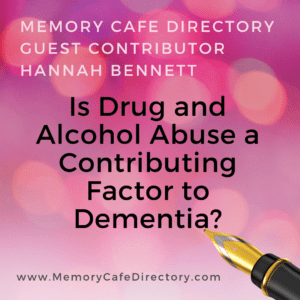Memory Cafe Directory posts and/or links to retailers can be advertising, sponsored, or affiliate links. We may earn a small commission from them. Thank you.
Is Drug and Alcohol Abuse a Contributing Factor to Dementia?
Submitted by Guest Contributor:
Hannah Bennett
Drug and alcohol abuse can lead to many different problems—mental illness, strains on relationships, changes in the body—but can it lead to dementia? Research suggests it has a stronger link than we might think.
Mild drug and alcohol use won’t necessarily cause dementia. Researchers have not found a connection between mild to moderate substance use and dementia. In this article, we’ll be talking about dementia as related to heavier substance abuse over a longer period of time (which can mean months or years, depending on the substance).
While there’s no known cure for dementia, there are ways to improve memory comprehension in those who abuse substances. First, let’s go over how dementia might result from drug and alcohol abuse.
Risk of Cognitive Impairment
We all know that drugs and alcohol impair judgment, social skills, motor skills, and many other physical functions. But the cognitive-impairment ability of substances might go deeper than the initial effects we see when someone uses drugs or alcohol.
This study looked into how acute drug and alcohol use can affect mental state and cognitive function. Researchers found that some substances can cause long-term cognitive impairments, including dementia, later in life.
Drugs and alcohol affect the same causal pathways that lead to cognitive impairment and dementia. Substances can change the chemical balances in a person’s brain, which can cause direct damage to the nerves.
No one knows exactly how much of a certain substance it takes to cause dementia; however, the research seems to point toward heavy use of a substance. Long-term smoking, use of benzodiazepines, marijuana, and alcohol have all been linked to deteriorated cognitive function.
Alcohol and Dementia
Alcohol has a strong link to dementia. Multiple studies have been conducted to reveal that those who consume alcohol heavily are much more likely to develop dementia later in life than peers who don’t have heavy alcohol consumption.
According to a Harvard survey of adults 72 and older with mild cognitive impairment, people who had more than 14 alcoholic drinks a week were 72% more likely to develop dementia than those who had less than one drink a week.
Drinking can also cause alcohol-related brain damage (ARBD), which usually develops in adults between 40 and 50 years old. This happens when a person over-consumes or binges alcohol over several years.
ARBD is not the same as dementia, because unlike with dementia, a person with ARBD can stop drinking and regain some of what they’d lost over time. However, there is another type of ARBD known as alcohol-related dementia. A person with this condition will likely struggle with memory, completing everyday tasks, and problem-solving.
Korsakoff Syndrome
Korsakoff syndrome is a type of dementia most commonly caused by drinking alcohol. The disorder is caused by a deficiency of thiamine (vitamin B1), which can be a result of drinking alcohol, dietary deficiencies, chronic vomiting, an eating disorder, or chemotherapy.
Vitamin B is a very important tool in the brain. It makes sure that the cells are all functioning properly, converts food into energy, and maintains overall brain function. Drinking alcohol hurts vitamin B absorption from the gastrointestinal tract. The longer a person drinks alcohol, the more vitamin B-deficient they become, leading to long-term problems, including dementia.
The disorder can often be preceded by Wernicke encephalopathy, so some people may refer to it as Wernicke-Korsakoff syndrome (WKS). But these don’t always happen together, a person can get Korsakoff syndrome without ever experiencing an episode of Wernicke encephalopathy.
If WKS does happen, it can cause side effects like:
- Double vision
- Drooping under eyelids
- Loss of muscle coordination
- Confusion
Eventually, the physical symptoms subside and the mental effects begin to take a more prominent role. This is the beginning of Korsakoff syndrome, which is characterized by effects like memory loss, trouble learning new information, and confabulation, or making up information when they can’t remember the details.
Marijuana and Dementia
Marijuana is a drug that directly interferes with memory. People who use marijuana have lower blood flow to the hippocampus, a part of the brain that’s responsible for memory. When someone uses marijuana over a long period, they’re depriving their brain of necessary blood movement to their brain’s core memory muscle.
A study published in the Journal of Alzheimer’s Disease showed this decreased blood flow in the brain. They found that marijuana causes low blood flow throughout the entire brain, with the lowest blood flow in the hippocampus. These findings suggest that marijuana has damaging influences on the brain.
Prescription Drugs and Dementia
While prescription drugs may seem safe because they’re prescribed by health care professionals, there are risks to any medications we put in our bodies. Two prescription drugs that have been linked to dementia are anticholinergic drugs and benzodiazepines.
Anticholinergic drugs are drugs that block acetylcholine, a neurotransmitter in the brain. Benzodiazepines (sometimes called benzos) have a calming effect. Both of these drugs can be abused, the more common of the two being benzos.
A Harvard study found that adults who took benzodiazepines for more than six months had an 84% greater risk of developing dementia than those who didn’t use benzodiazepines. And the long-acting benzos (like diazepam or flurazepam) had a much higher dementia risk than short-acting pills (like lorazepam or triazolam).
This shows that drug use doesn’t have to happen for a decade to lead to serious consequences. Just six months of using drugs like benzos can have lasting impacts on a person’s mental wellbeing.
Opioids and Dementia
Opioids are painkillers that are often prescribed or obtained illegally to be abused. There are growing numbers of people across the nation taking opioids for chronic pain, which is contributing to a larger issue of opioid abuse.
Research from the National Institute on Drug Abuse found that people with higher opioid use had a slightly higher dementia risk than people with little or no opioid use. However, this evidence isn’t strong enough to suggest that opioids cause dementia.
It’s still not clear whether opioids cause dementia, or whether chronic pain leads to dementia. Chronic pain is usually the primary motivator for taking opioids, but pain can also hurt a person’s attention capacity and memory. The emotional and physical stress of dealing with pain can activate stress-hormone pathways that lead to cognitive decline.
Hope for Loved Ones Who Struggled With Drug or Alcohol Use
If your loved one is living with dementia and abused drugs or alcohol in their younger years, there is hope. We can still help our loved ones to improve their memory skills.
There are multiple activities you can do with your loved one to work on strengthening their memory and comprehension skills. Try solving a few math problems, make to-do lists, working on puzzles, and playing card games.
All of these activities and more can help to improve your loved one’s quality of life. If drugs or alcohol contributed to their memory loss or development of dementia, work those muscles again with them.
And remember, do these activities with your loved one! It’s tough starting new habits as an adult, especially for those living with dementia. Be an example for your loved one and start healthy habits together.
Hannah Bennett

Hannah Bennett
Hannah Bennett is a content specialist for AdditionResources.net, a content guide that provides evidence-based information on addiction, substance abuse, mental health, and treatment for those who struggle with addiction and their loved ones.
Become a Contributor!
 Do you want to be a Memory Cafe Directory contributor? If you have helpful information to share with our community, read about the guidelines, then get in touch to discuss what you have to offer.
Do you want to be a Memory Cafe Directory contributor? If you have helpful information to share with our community, read about the guidelines, then get in touch to discuss what you have to offer.
Thank you.






